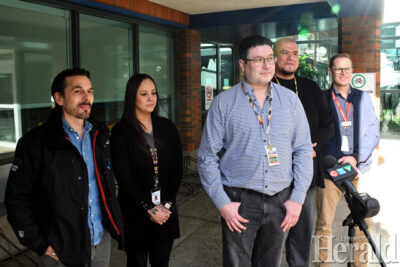Indigenous-led Patient Navigation service re-launched
By Ry Clarke - Lethbridge Herald Local Journalism Initiative Reporter on January 11, 2023.
 Herald photo by Ry Clarke
Members from Alberta Health Services and The Four Winds South Zone Project announce the re-launch of the Indigenous Patient Navigators Project, helping Indigenous peoples access healthcare, Tuesday at Chinook Regional Hospital.
Herald photo by Ry Clarke
Members from Alberta Health Services and The Four Winds South Zone Project announce the re-launch of the Indigenous Patient Navigators Project, helping Indigenous peoples access healthcare, Tuesday at Chinook Regional Hospital.A service being re-launched in southern Alberta will work to help identify and remove obstacles towards accessing healthcare for Indigenous peoples.
The Four Winds South Zone Project is supporting navigation and coordination of access to Alberta Health Services through the Indigenous Patient Navigators. The service was put on hiatus to respond to pandemic health needs, but is now being relaunched.
“The Four Winds Project is a research grant supported by Alberta Innovates, with Alberta Health Services, to improve Indigenous patient experiences and health outcomes,” said Kienan Williams, program lead for Innovation and Research with the Indigenous Wellness Core, during a media announcement at Chinook Regional Hospital on Tuesday. “The pandemic came along and all of the people doing our work were also health leaders within Alberta, within the federal government, and more importantly at our Nations and Indigenous communities. Now that we have entered into a different phase, we are happy to announce the re-launch of not only the Four Winds Project, until January 2024, but specifically to acknowledge the re-launch of our Indigenous Patient Navigation service.”
The programs is looking to help support Indigenous patients through their pre-admission, emergency hospital admission, inpatient stays, and discharges. The services will be offered through the Four Winds at Chinook Regional Hospital, Cardston Health Centre, Pincher Creek Health Centre, and Fort Macleod Health Centre.
“Care starts close to home, and this is an opportunity for us to support our community members,” said Williams. “We had a community member come forward and say this was my experience and how it did not work. That is why there is a need for this. During our soft launch we supported 100 Indigenous patients, that is from October to December.”
Navigators will help assist Indigenous patients navigating through the medical services, with a goal of helping enhance experience and encounters in the healthcare system. “This is a wonderful opportunity, not only to help navigation or help patients navigate the health system, this is also an opportunity for us to learn to make sure that we do not repeat some of the errors and remove the barriers that we need to remove in the system so that the health system is friendly and supportive,” said Colin Zieber, senior operating officer with AHS. “We have heard feedback, not only in hospital care, but in the community. That Indigenous patients find it confusing at times, even traumatizing, the health system. We need to look at how we learn from this project.”
With the support of $1.4 million in grant funding from the Partnership for Research and Innovation in the Health System, the Four Winds project has been secured until June, 2024.
“We identified looking at four sites to start support as a small scale, and already we have expanded beyond that,” said Williams. “We want to make sure those with high needs are able to have access, and we want to support reducing those wait times, but making sure the right care at the right time is being accessed.”
9-8


